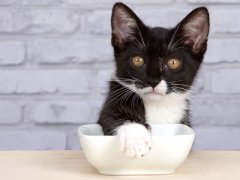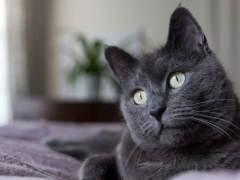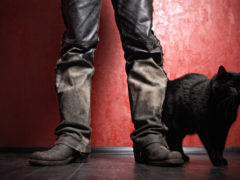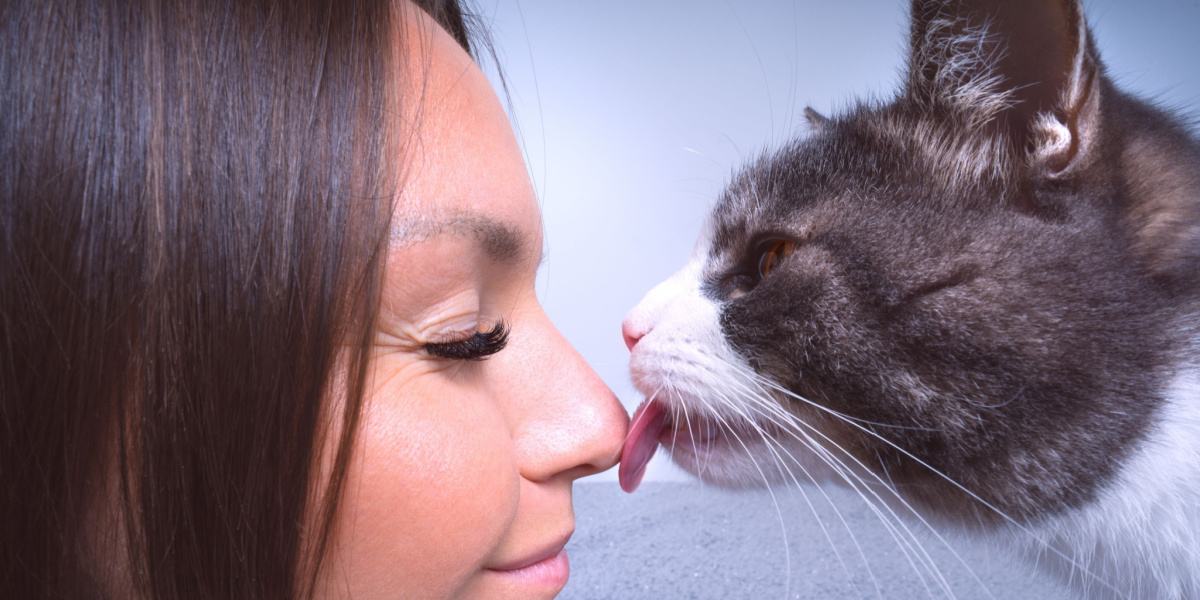
We love our cats unconditionally, but cat behavior can be curious and confusing at times. Many cat parents ask, “Why does my cat lick me all the time?” or “Why does my cat lick me and not my husband?”
Your cat might lick one person more if they want their attention, or if they like the smell and taste of them. Licking can be a sign of affection from your cat or their way of seeing you as one of their own kind, but it can also be a sign of pain, nausea, or anxiety. If a cat spends an excessive amount of time licking one member of their human family over others, it is a sign something isn’t right.Key Takeaways
Well, there is not one straight answer to this. There are several reasons your cat might lick you more than your husband. So, let’s get a bit more insight into this particular aspect of cat behavior.
Reasons Why Cats Lick Their Owners
1. Your Cat Is Grooming You
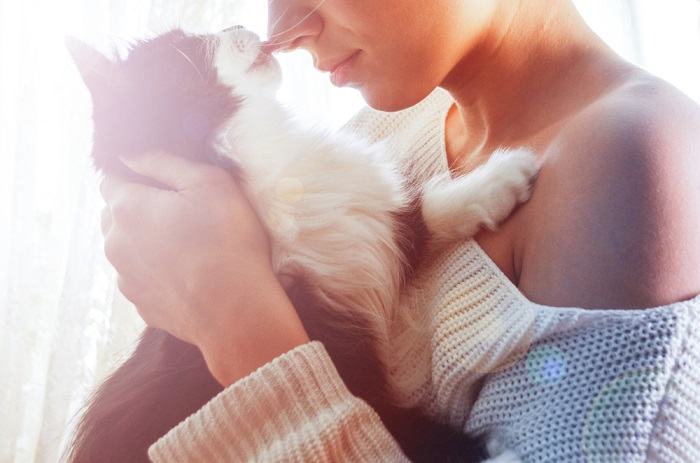
Cats lick themselves to get clean, and they want us to be clean as well.
Cats are extremely clean creatures, and grooming is an important and normal behavior for cats. In fact, they spend around 8% of their time grooming. Cats are social groomers, so they lick us because they want us to be clean, too. They will often nibble or pull at your skin to remove something, but usually, they just spend a while licking around your skin.
Being bathed by your cat is a sign of affection and a sign they see you as one of their own. If your cat is grooming you more than your husband, they might feel more closely bonded to you than they do to him.
Also Read: Why Do Cats Groom Each Other? Reasons Why Cats Socially Groom
2. Your Cat Is Showing Their Affection For You
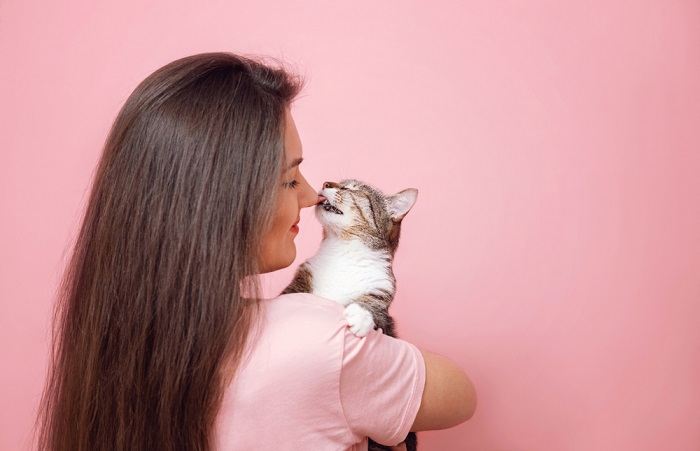
When your cat licks you this is known as allogrooming, also called social grooming
Cats lick each other within their social groups in the wild. It’s called allogrooming, and it’s when mother cats groom their kittens, and other cats groom one another. So, it’s a friendly and instinctive behavior to lick those they have affection for. The instinct is designed to strengthen bonds and nurture one another, so you should be flattered if your cat wants to lick you.
If your cat is licking to show affection to you and not your husband, it might be because they feel closer to you and less connected to your husband. This can occur if you are the one who spends the most time with your cat, whether playing with them, feeding them, or simply cuddling with them on the couch.
Also Read: Why Do Cats Lick You?
3. Your Cat Is Attention Seeking
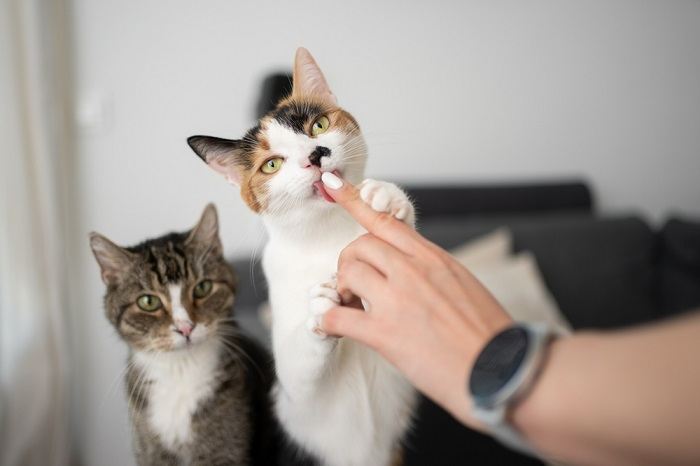
Licking you can be a demand for attention—you’re certain to take notice!
Cat behavior is a complex subject, and there can be many signs that your cat is demanding your attention. Cats knead, lick, purr, meow, and demand a cuddle when they want to receive love and affection from us. But excessive licking of a particular member of the human family might mean they are specifically seeking that person’s attention.
If you are the person who generally feeds your cat, the one who usually lets your cat outside in the mornings, or the one who spends the most time at home, your cat might default to licking you for attention rather than your husband.
Also Read: 7 Common Cat Vocalizations And What They Mean
4. Your Cat Is Anxious
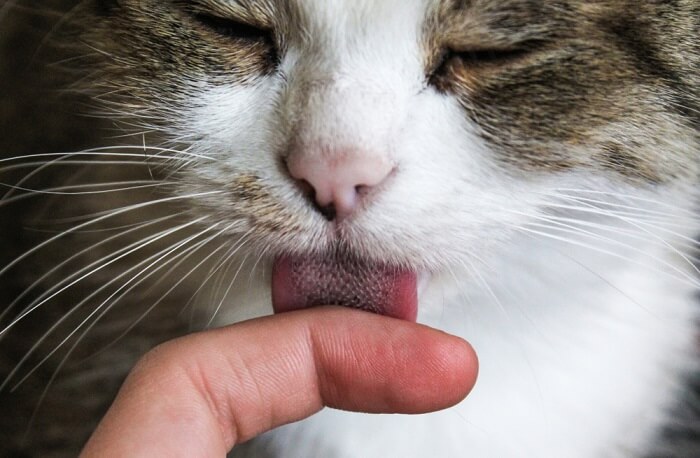
If they are feeling nervous or uneasy some cats lick excessively as a method of self-soothing.
Excessive licking of a particular person in the family might be a sign of anxiety, and possibly a cause for concern. If your cat is licking you and not your husband, it might be because they feel more reassured by your presence or simply because they are used to turning to you for all of their needs. When they are stressed, cats might lick themselves excessively, too.
There can be so many causes of stress, such as moving to a new home, a new baby, a new cat or dog, a change in routine, or even just moving furniture around. Reading your cat’s body language can help you spot when something isn’t right.
If you are concerned about behavior problems or a change in your cat’s behavior, seek advice from your veterinarian. Separation anxiety can take time and patience to overcome, but your vet will be able to guide you on how best to help your cat.
There are lots of ways you can help your cat at home to reduce their stress, including:
- Ensure they have a clean litter box
- Ensure you have enough litter boxes for the number of cats in the house
- Keep their feeding routine the same each day
- Leave music or the television on when you are out
- Use of pheromones to help calm them
- Ensure they have access to plenty of toys and enrichment
- Encourage all members of the family to play and interact with your cat so they don’t rely on one particular person to meet their needs
Also Read: Cat Separation Anxiety: Causes, Symptoms, And Treatment
5. Your Cat Likes The Way You Taste
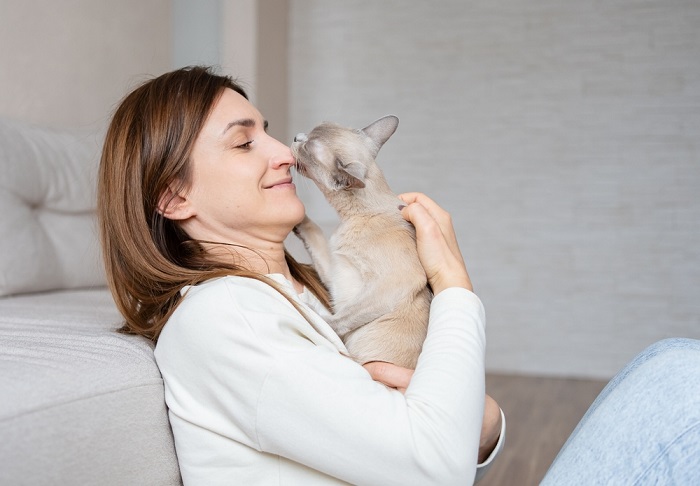
If your cat licks you more than your husband, it could simply be that your skin has an appealing taste.
If your cat is licking you more than your husband or another member of your family, it might just be a sign that they like the way you taste! Your hands might smell or taste of food (yours or theirs!), or they might love the taste of your skin lotion, shampoo, or perfume.
Cats have a great sense of smell and are also attracted to human perspiration as it is salty and sugary, so you might find your cat licking you after you’ve done some exercise. Always be aware that some of your skin products could be harmful to your cat, so it’s best not to let them lick off something that isn’t meant to be ingested.
Also Read: Do Cats Have A Good Sense Of Smell?
6. Your Cat Is Displaying Kitten-Like Behavior
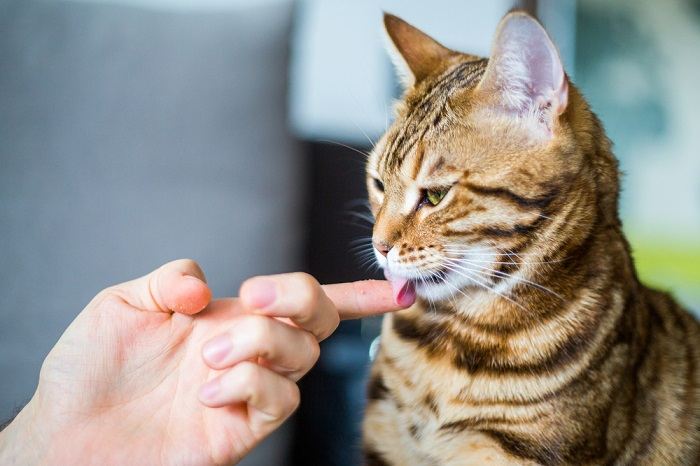
Kittens that were weaned too young sometimes hold over certain behaviors like licking or kneading.
If kittens are weaned from their mother too early, they can continue to show signs of nursing toward their human family in place of their feline family. This is their way of seeking comfort from you in the same way they would from their mother.
Your cat might favor licking you over your husband if they feel more closely bonded to you because you feed them or spend more time at home with them.
Also Read: Why Do Cats Purr When They Sleep? A Vet Explains
7. Your Cat Might Have A Medical Problem
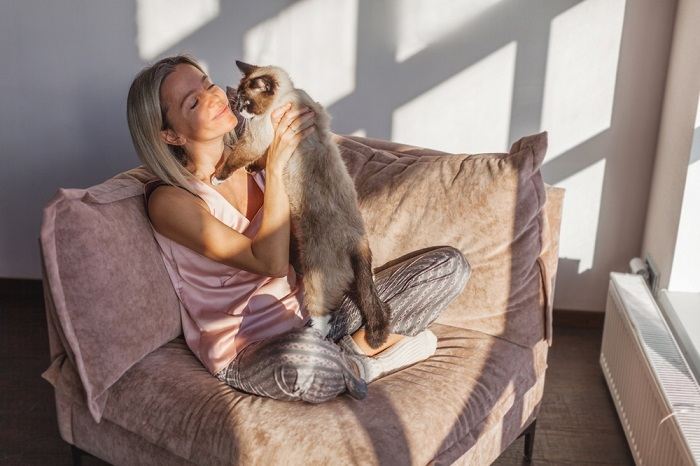
If your cat is suddenly licking you a lot and this is a new behavior, schedule a checkup with your veterinarian.
Your cat might lick you or other objects because they are unwell. Excessive licking can be a sign of nausea or pain or might even just be their way of letting you know they feel poorly and attempting to get your attention. If your cat is licking you and not your husband, it might be because you are their source of comfort when they feel unwell. If your cat’s licking has become excessive or only just started, it’s best to get them checked by your veterinarian.
Also Read: 10 Subtle Signs Your Cat May Be Sick
Is It Safe For Your Cat To Lick You?
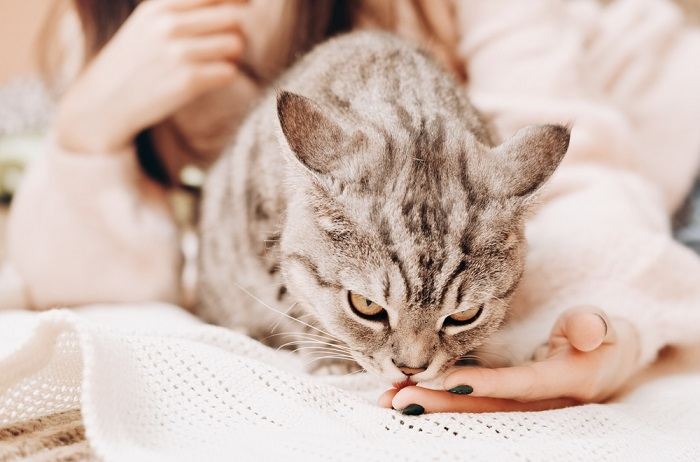
Don’t let your cat lick harmful creams or topical medications from your skin.
It’s usually pretty safe to accept some grooming from your cat, but there are some potential risks. Cats have a lot of bacteria in their mouth, which could be transferred to your skin. Although it is extremely rare to contract an illness from your cat, it’s best not to let your cat lick your mouth or an open wound.
Sometimes cats give us a little love bite—just a little nibble on the skin—and this is a sign of affection. But if your cat breaks your skin with their teeth, this isn’t so good. Cat bites can turn very nasty due to bacteria in their mouths. If you receive a cat bite, seek immediate medical advice.
Some medical treatments that you apply to your own skin could also be harmful to your cat, so you shouldn’t let them lick you in any areas you have applied these kinds of topical treatments.
Also Read: Best Cat Grooming And Deshedding Gloves
How Do I Stop My Cat Licking Me?
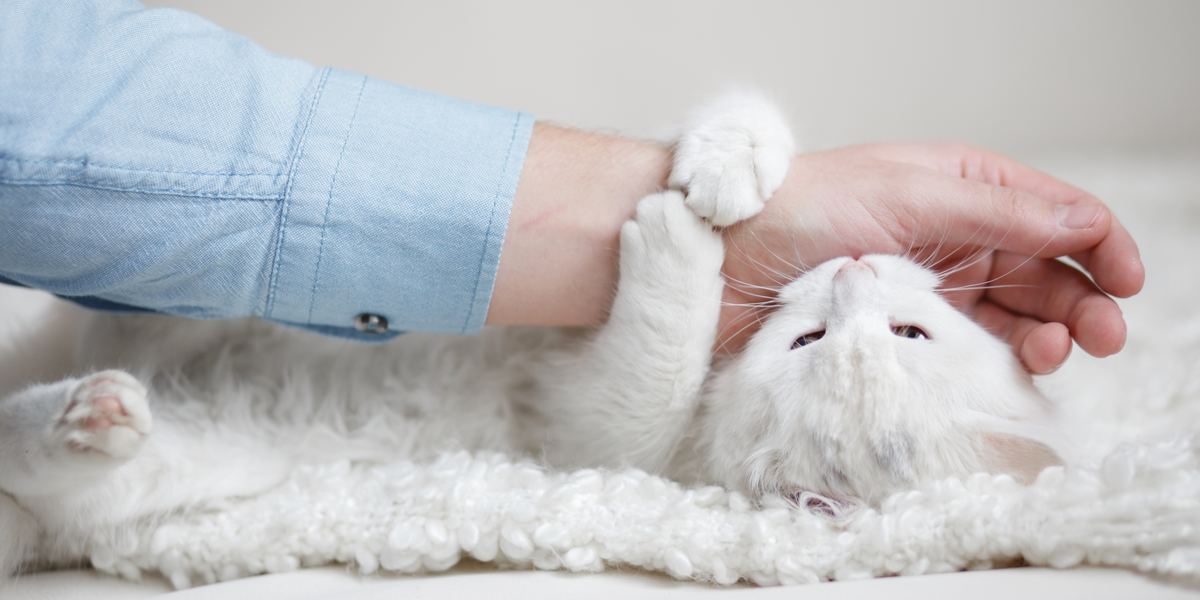
If your cat licks you for more than half and hour at a time, or is constantly seeking you out for licking, talk to your vet.
Receiving a bath from your cat can be cute, and is important bonding time with your pet. But any cat owner will know, it isn’t always a comfortable experience being groomed by a cat. A cat’s tongue is rough because it is covered in tiny spikes called papillae. These papillae are designed to comb through your cat’s fur and remove dirt. They also help remove flesh from bones when they hunt and eat their prey, as well as help them lap up water when they drink.
But how much is too much licking? If your cat has started to spend an excessive amount of time licking you or shows a preference for licking one member of their human family over others, it is a sign something isn’t right. About 30 minutes or more per licking session would be considered excessive, and it can also start to cause irritation to your own skin as cats have rather rough tongues.
If you think that your cat’s licking is excessive, it’s important to schedule a visit with the veterinarian so you can get to the root of your cat’s licking. Once you know what’s causing it, your vet can help you implement ways to stop it.
Also Read: Cat Love Bites: 5 Reasons Why They Do It & How To Respond
Final Thoughts
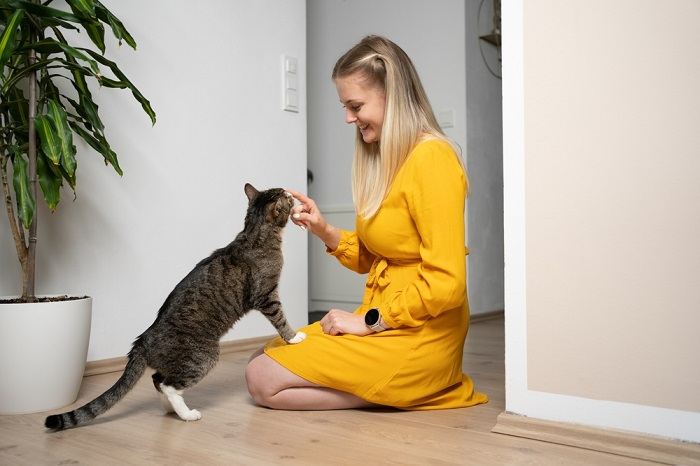
Licking behavior can be a completely normal part of interacting with our cats—it’s a sign of affection and a sign that they see you as part of their social group. If your cat is licking you but not your husband, it might be because you and your cat have a closer relationship than your husband and your cat. Sometimes, cats just like the taste of one person over another.
But licking can also be a sign that something isn’t right. If your cat is licking you excessively it might be a sign of loneliness, separation anxiety, or a health problem. If you are concerned about changes to your cat’s behavior, it’s best to get them checked at the vet and to seek advice from an animal behaviorist.
Also Read: 9 Unmistakable Signs Your Cat Loves You
Frequently Asked Questions
Why does my cat only lick me and not my husband?
Your cat might have a tendency to lick you more than your husband if they are feeling a particular need for your attention, if they have separation anxiety, or if they like the smell and taste of you.
Why does my cat like me and not my husband?
Cat owners will often notice that cats can be picky about who they like. Your cat is unlikely to dislike your husband but perhaps doesn’t have as close a relationship with him if he interacts less often with your feline family members.
Does a cat licking you mean they love you?
Licking can be a sign of affection from your cat or their way of seeing you as one of their own kind. However, it can also be a sign of pain, nausea, or anxiety.
Why do cats lick some people and not others?
Cats lick the people they want attention from. They also lick you if they like the smell or taste of you if they are anxious, or simply want to show affection for you.


